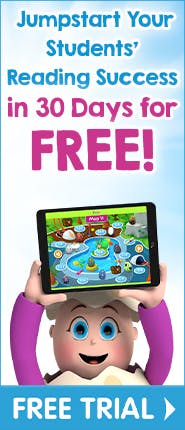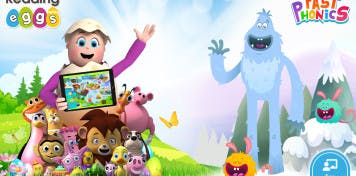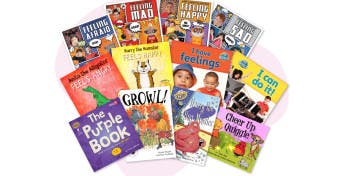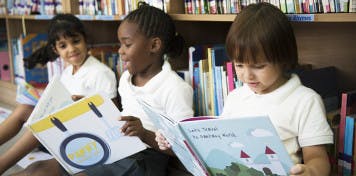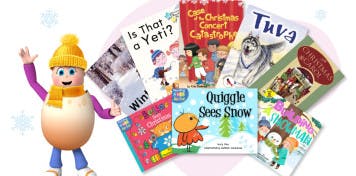


29 Must-Read Earth Day Books To Inspire Students To Care For Our Planet
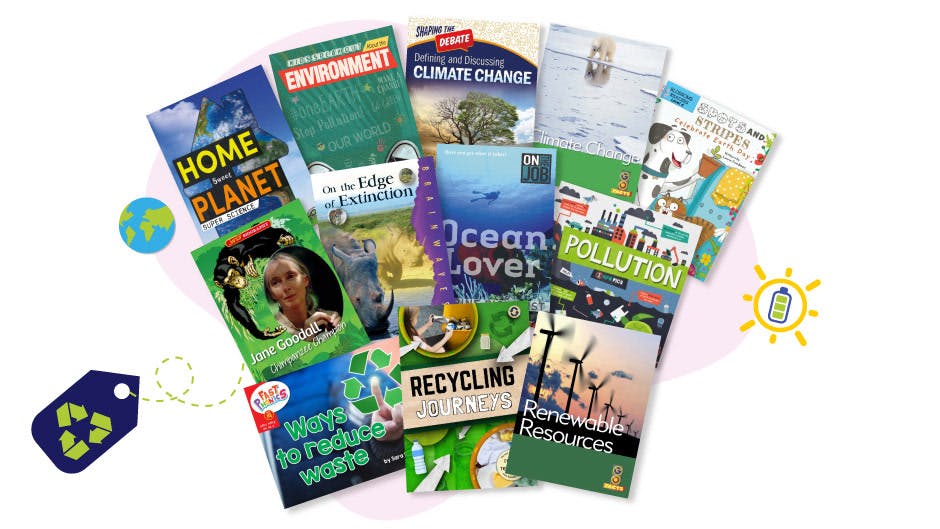
Sharing stories with young learners about our natural world and how to care for it instills a sense of responsibility towards the environment from an early age.
Such stories also foster a deeper connection to nature and allow students to learn about the various ways they can actively contribute to its preservation.
More importantly, they provide a platform for discussions, reflections, and opportunities to explore different perspectives on environmental issues and empower young learners to become informed global citizens.
Celebrate Earth Day with these informative books in the Reading Eggs Library
Earth Day is the perfect time to highlight books about appreciating and preserving our environment.
These educational, environmentally-focused titles in the Reading Eggs ever-growing online library will inspire young budding environmentalists to take action and help make our world a cleaner, more beautiful place to live.
What makes Reading Eggs books unique?
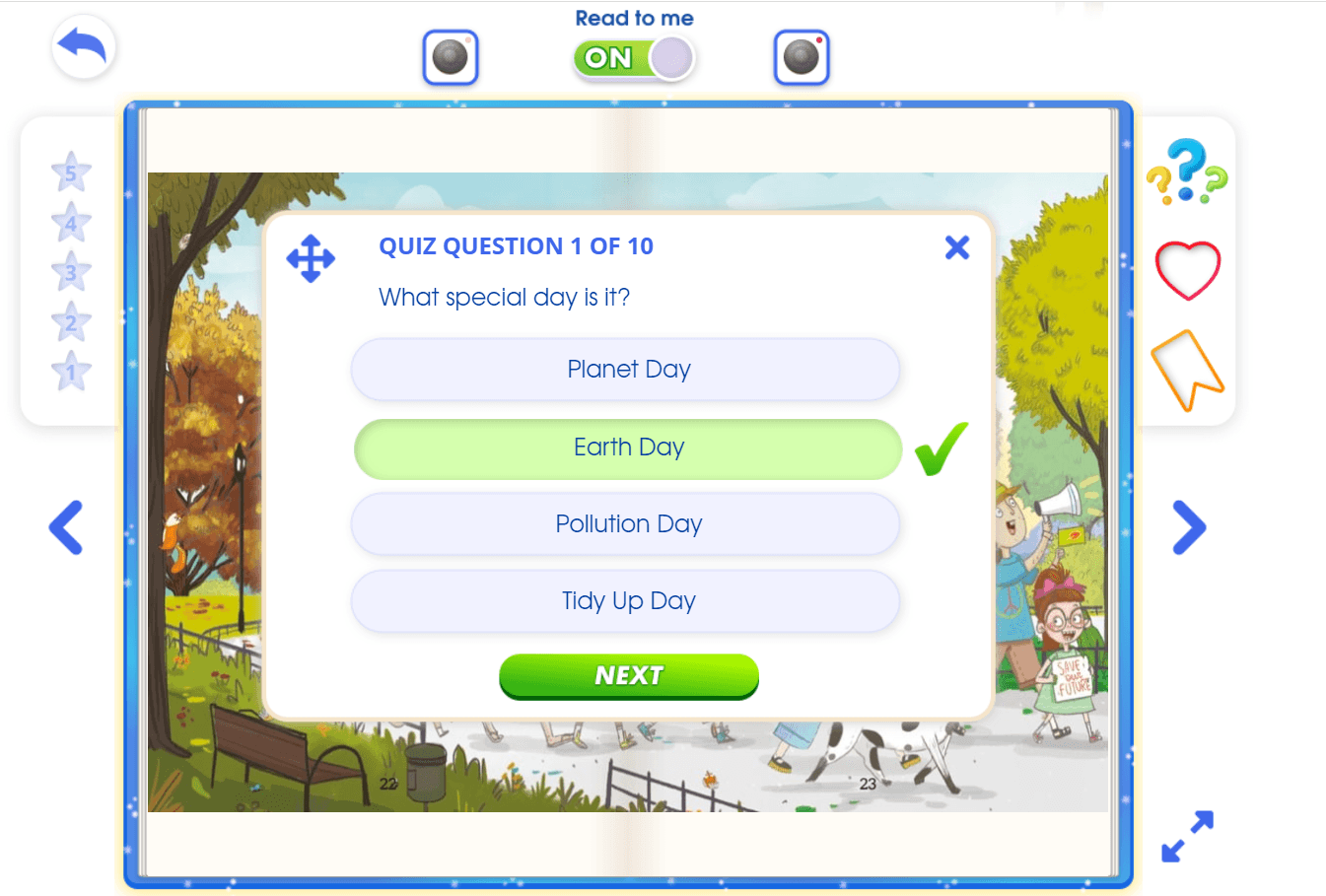
When students ace the comprehension quiz at the end of each book, they’re rewarded with golden eggs which can be used to decorate their avatars and homes in the program, making reading even more engaging and fun! Students also get to express their opinions and write a short review of books they’ve read in the Library.
Teaching a class of younger learners? The read-to-me audio support in our lower-levelled books, allow students to read independently and strengthen their reading fluency.
Plus, all the books read in the Library are automatically added to your students' Reading Journals, sparking delight and celebration as they track their reading achievements and discover the joy of reading for pleasure!
There are over 4,000 non-fiction and fiction titles to choose from in the ever-expanding Reading Eggs digital Library. Get access to ALL the books in the Library with a school subscription.
Earth Day books for children about biodiversity
Where am I?
Students are introduced to basic geography words in this text. With clues and questions, young readers will learn about the different types of landforms such as mountains, caves, deserts and other natural features.
Reading age: 5–7 years old | Lexile: 330L
City, Farm and Sea
Some animals live by the sea. Others live on farms. What animals live near your home? In this book, readers will learn that different animals live in different environments.
Reading age: 5–7 years old | Lexile: 390L
Super Science: Home Sweet Planet
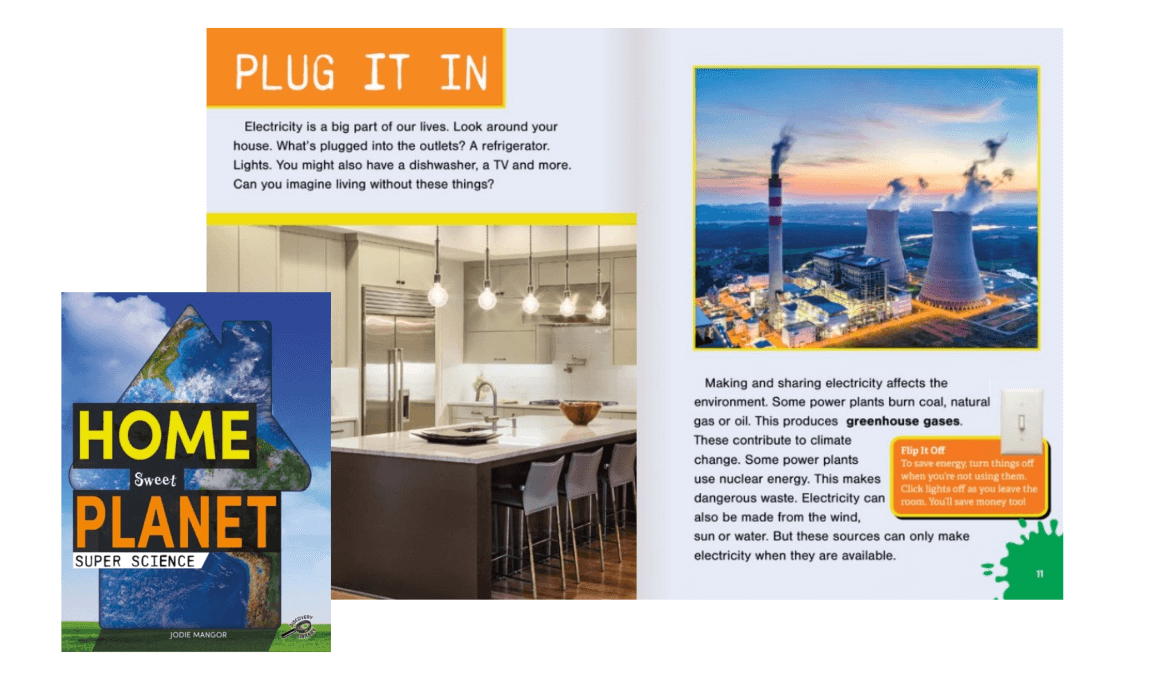
This book explores the environmental impact of everyday conveniences, with relatable examples and engaging illustrations. It presents standards-based concepts in a fun and informative way. Minimal text maximizes engagement for early readers and supports science curriculums.
Reading age: 7–9 years old | Lexile: 550L
Here Today, Gone Forever!
Animal species are disappearing from the Earth at an alarming rate due to human activity. Many are on the verge of extinction, but efforts are being made to save them. For example, readers will learn how the Przewalski's horse was brought back from extinction in the wild through breeding and reintroduction efforts.
Reading age: 7–9 years old | Lexile: 680L
Symbiosis

In this non-fiction text, students will uncover the intricate web of relationships in an ecosystem, where living things depend on each other for food and shelter. They'll learn about the crucial roles of producers, consumers and decomposers and the potential consequences when these connections are disrupted.
Reading age: 7–9 years old | Lexile: 820L
Ecosystems
Ecosystems is an overview of ecosystem types in Australia, South America and Africa, with profiles of plant and animal species on all three continents.
Reading age: 7–9 years old | Lexile: 900L
Oceans Inside Out

Dive into the world of oceans and discover the rich and diverse life within. Learn about majestic whales, tiny organisms, and how to protect our precious waters. A teacher's guide is also available. Other Inside Out titles in the Reading Eggs Library include Islands, Forests, Wetlands, Mountains, Grasslands, Tundras and Deserts.
Reading age: 9–12 years old | Lexile: 980L
On the Edge of Extinction
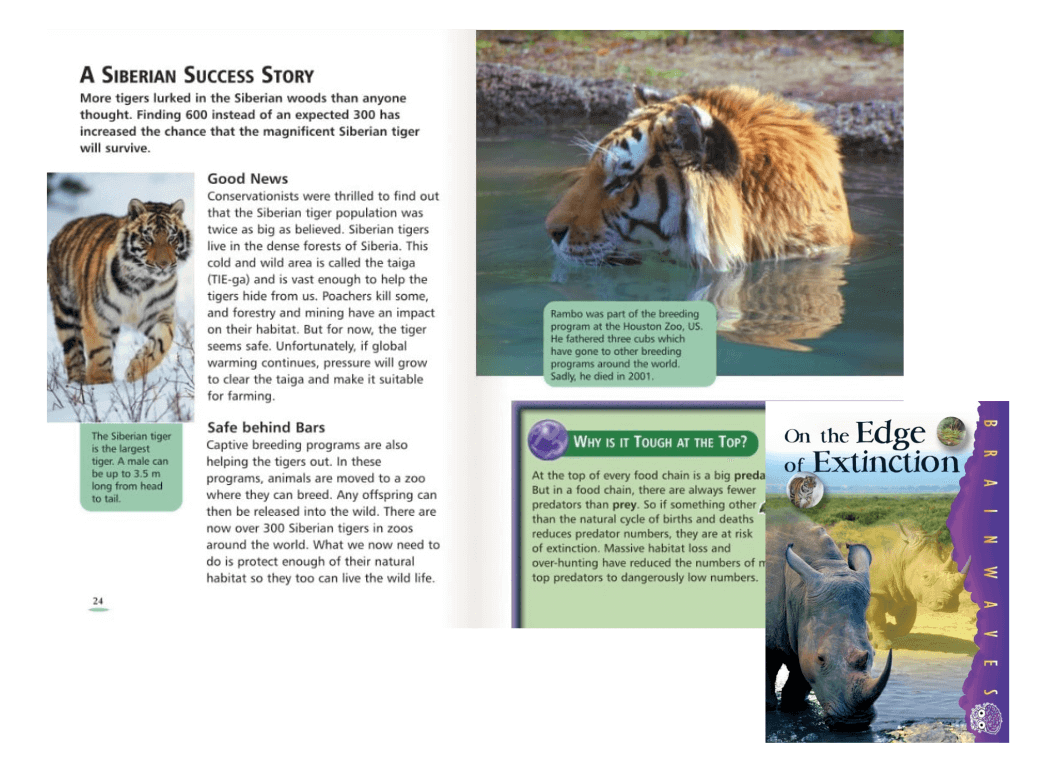
How do animal and plant species disappear from the face of the Earth? Students delve into the world of biodiversity loss and conservation efforts in this eye-opening book. They discover the disappearance of animal and plant species from Earth and learn about species at risk and the ongoing efforts to address these critical issues.
Reading age: 7–9 years old | Lexile: 980L
Jumpstart your students’ reading success with Reading Eggs today!
In addition to boasting a digital library of over 4,000 books, Reading Eggs also includes 120 core reading lessons, hundreds of activities, animated rhymes and songs to keep your students engaged while they build their reading skills.
Earth Day books for children about Conservation
Spots and Stripes Celebrate Earth Day
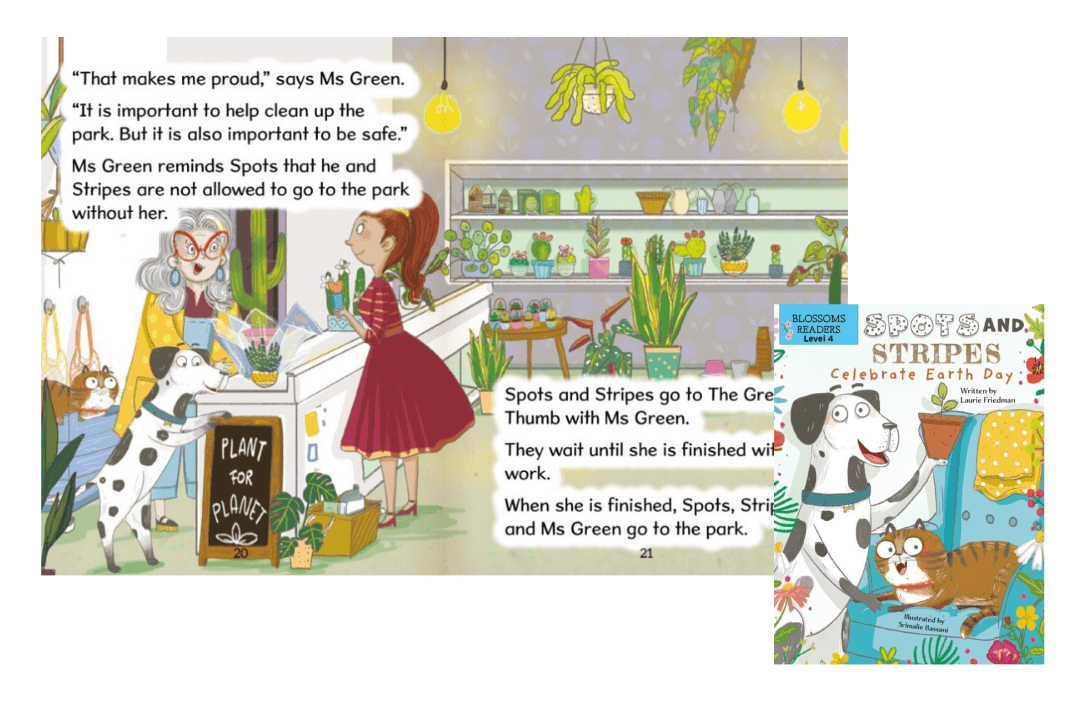
On Earth Day, Ms. Green's dog, Spots and cat, Stripes, are left at home to plan how they can work together for the planet. Can they resolve their differences and find a way to make a positive impact? Join their adventure and find out!
Reading age: 5–7 years old | Lexile: 480L
Why Recycle?
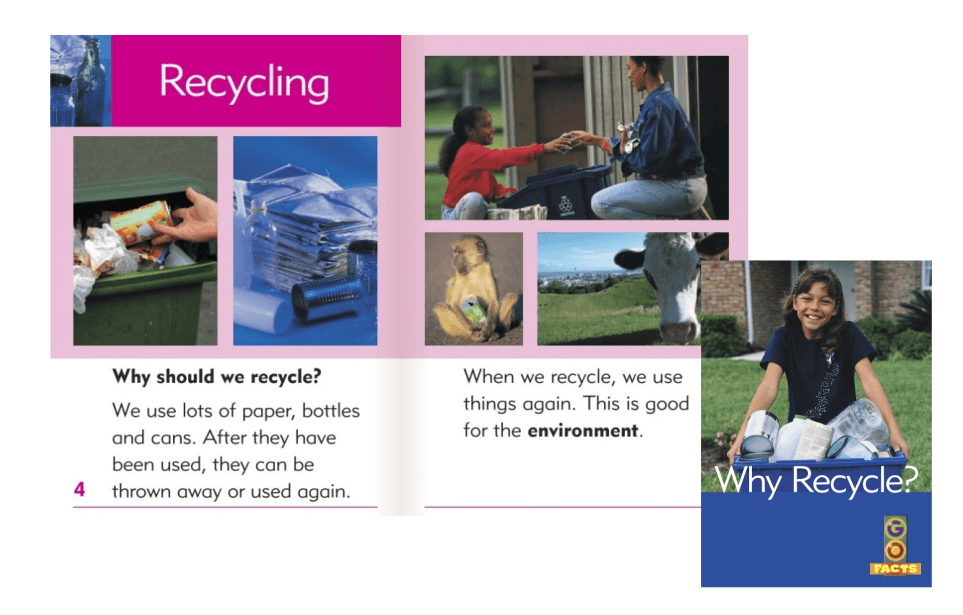
Why is it important to recycle? This book explains the importance of recycling and teaches students how different materials such as paper, cans and glass can be recycled to conserve resources.
Reading age: 5–7 years old | Lexile: 520L
Beach Clean-Up
This phonics decodable reader shares why we need to ensure our beaches are clean. It’s suitable for beginning readers working on Phase 5 of Letters and Sounds. The focus sound is ‘ea’, with new high-frequency words ‘look’, ‘often’, ‘or’, ‘other’, ‘people’ and ‘should’.
Reading age: 5–7 years old | Lexile: 520L
Recycling Journeys
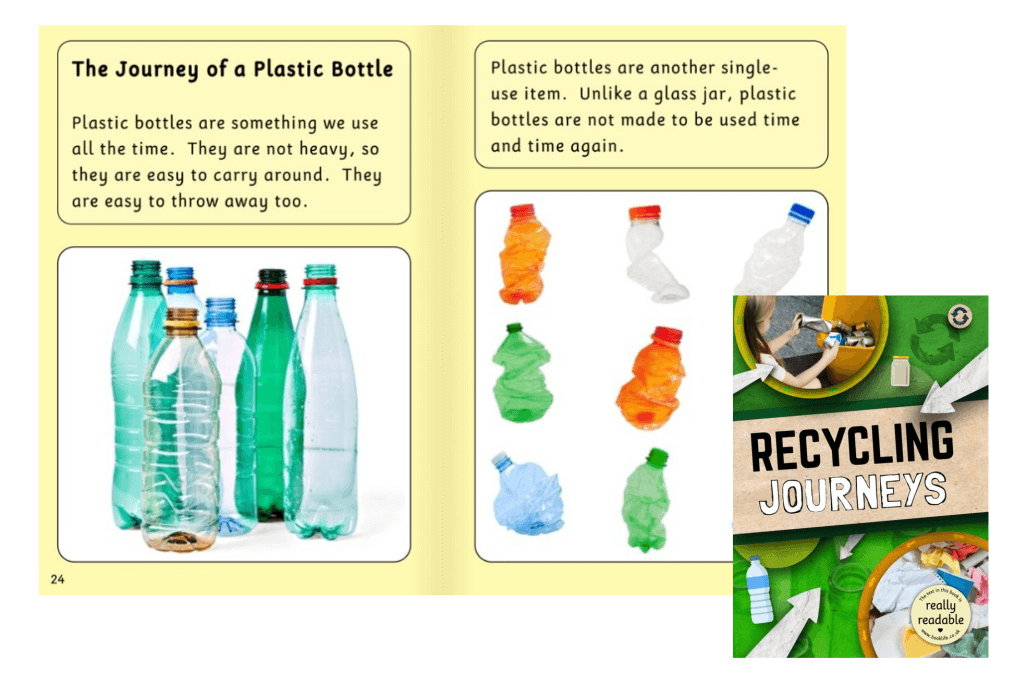
What happens when we throw something away? In this informative book, students follow the fascinating journey of the recycling process and learn how thrown-out objects like plastics and glass can be transformed into new products.
Reading age: 7–9 years old | Lexile: 570L
Ways To Reduce Waste
This phonics decodable reader talks about the different methods students can reduce waste. Suitable for beginning readers working on Phase 5 of Letters and Sounds, the focus sounds in the book are: soft ‘c’, soft ‘g’, ‘ow’, ‘ea’ and ‘y’. The new high-frequency words are ‘give’, ‘gives’, ‘many’, ‘most’, ‘once’, ‘our’ and ‘very’.
Reading age: 5–7 years old | Lexile: 570L
Kids Speak Out About The Environment
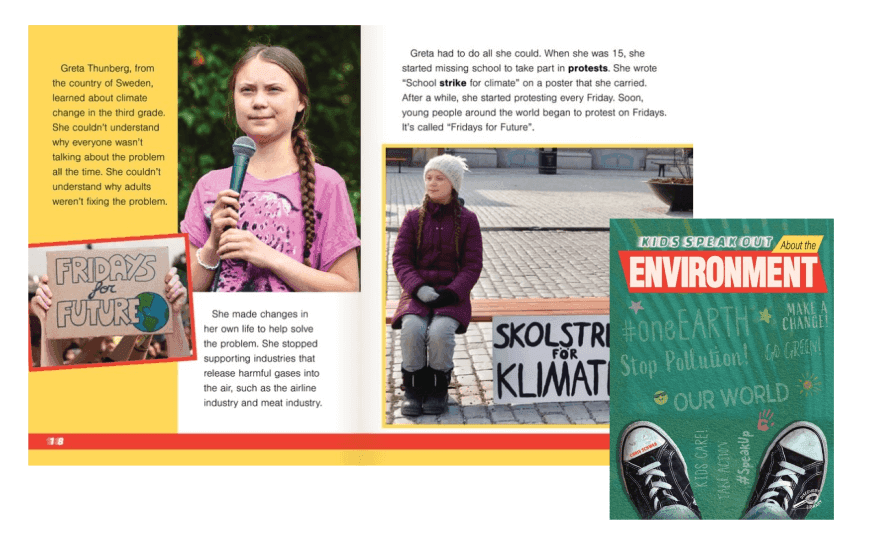
Part of the Kids Speak Out series, this inspiring book highlights youths who are speaking up to protect our planet. Featuring five youth activists, including Greta Thunberg, learners can see how these environmentalists are taking action to reduce pollution and raise climate change awareness around the world.
Reading age: 7–9 years old | Lexile: 650L
Pollution
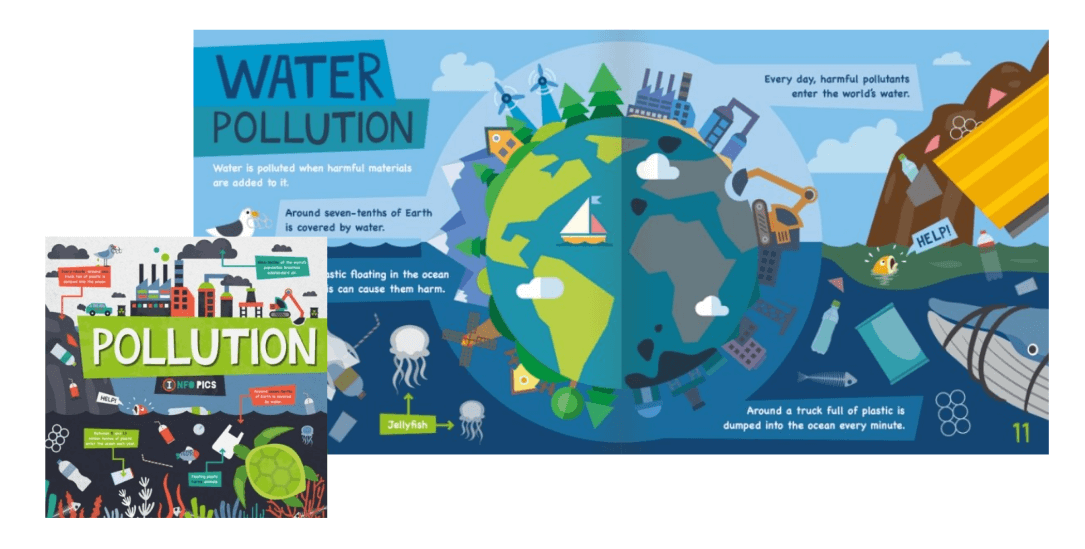
With 90% of the global population breathing polluted air, it's crucial to start conversations about pollution and conservation with young children. This book introduces these concepts in a fun and simple way with colourful illustrations to engage young readers.
Reading age: 7–9 years old | Lexile: 670L
Jane Goodall: Chimpanzee Champion

Jane Goodall is a scientist who observed and studied wild chimpanzees in Africa for over 50 years. This biography introduces readers to Jane’s childhood and her work and initiatives to protect animals and their environment.
Reading age: 7–9 years old | Lexile: 760L
Rachel Carson: Conservation Crusader
Rachel Carson was an American writer and marine biologist, who became one of the first conservation advocates and environmental scientists in the United States. This chapter biography introduces readers to Carson’s life, as well as her work, including Silent Spring and its influence on the United States and the pesticide industry.
Reading age: 7–9 years old | Lexile: 780L
Ocean Lover: Marine Biologist's Journal
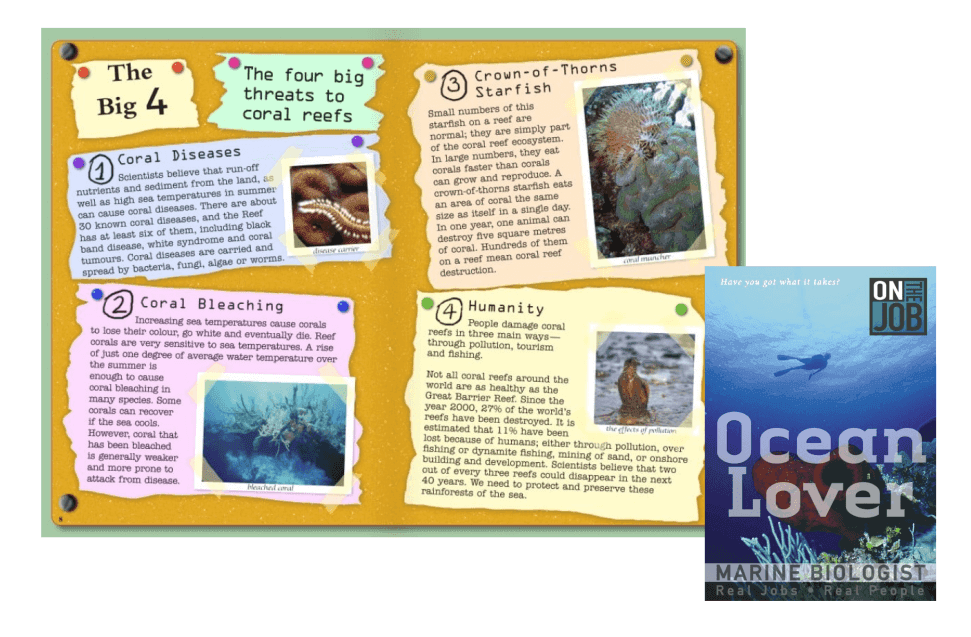
Do you think you’d like to dive to the bottom of the ocean? Get close to living things in the water? Students discover what it takes to be a marine biologist and get a fun-packed tour behind the scenes. This book is part of the On the Job series. Other titles in this series can also be found in our online library.
Reading age: 9–12 years old | Lexile: 990L
Recycling
This book explores the world of recycling and unveils the positive impact it has on conserving natural resources and reducing litter and land waste. From bricks to batteries, milk cartons to mobile phones, students learn about the wide range of items that can be recycled instead of discarded.
Reading age: 9–12 years old | Lexile: 1070L
Conservation

Students learn about the abundant natural resources that our planet provides, such as forests, water, soil, animals and oil. They also explore the challenges we face in protecting and preserving our environment and discover how they can make a positive impact to ensure a healthy and sustainable future for our Earth.
Reading age: 9–12 years old | Lexile: 1170L
Log in to Reading Eggs account now and get exploring!
Earth Day books for children about sustainability
Where does our food come from?
Young readers will embark on a delicious journey to learn about the origins of various food groups, including grains, vegetables, fruits, meat, eggs and dairy foods. They'll explore how grains are grown in fields, the nutritional benefits of vegetables, where different fruits thrive, and the importance of pollination.
Reading age: 5–7 years old | Lexile: 500L
From Farms to You
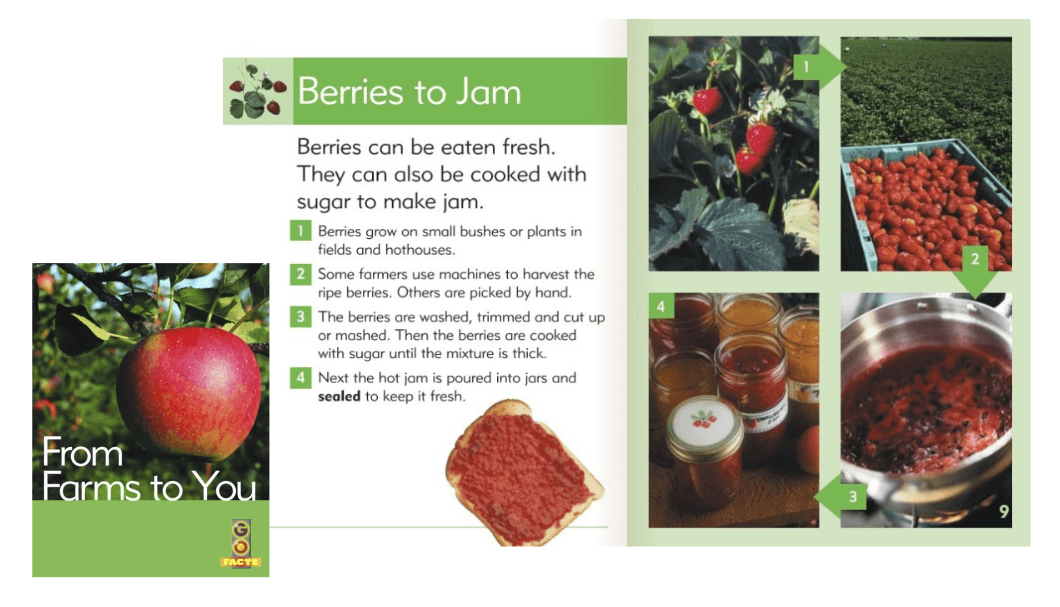
How do our foods transform from farm to table? In this book, young readers will discover the journey of wheat, from the farmer's field to becoming pasta on their plate. They'll learn about the various stages and processes involved, including planting, harvesting, milling and pasta production.
Reading age: 5–7 years old | Lexile: 690L
Our Resources
In this book, students learn about the Earth’s many resources such as freshwater, soil, forests, minerals and the importance of using resources wisely. Other titles in the GoFacts Science set include Sky and Seasons, Everyday Materials and Daily Science.
Reading age: 9–12 years old | Lexile: 660L
Sustainability
There are 7 billion people on Earth - can the planet support us all? This book explains the concept of resource sustainability and how to reuse, recycle and reduce the use of materials. Other titles in the GoFacts Geography set are Australia, Ecosystems and People and the Land.
Reading age: 9–12 years old | Lexile: 870L
Renewable Resources
In this book, students learn about the different renewable resources such as sunshine, wind, flowing water, organic materials and geothermal energy.
Reading age: 9–12 years old | Lexile: 980L
Reshaping the Environment
From ancient fire-stick farming practices to modern gas mining, students delve into the history of human impact on natural environments in this book. They explore the complex decisions involved in determining the capacity of environments to handle human development and recover from it.
Reading age: 9–12 years old | Lexile: 990L
Earth Day books for children about climate change
The Carbon Cycle
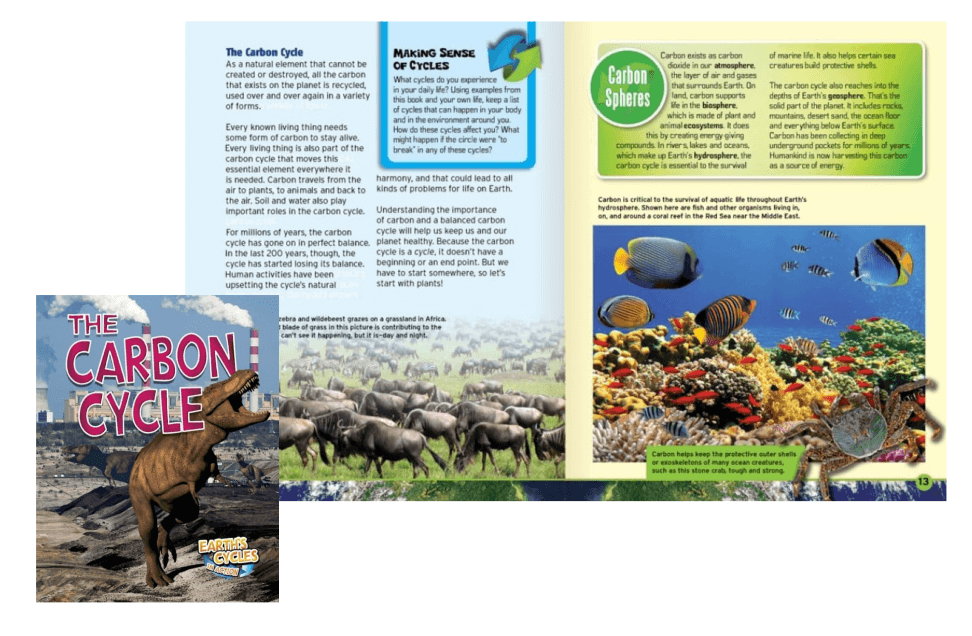
In this book, students will uncover the secrets of the carbon cycle. Through accessible text and detailed images, they'll learn how carbon moves among the oceans, atmosphere, ecosystem and geosphere. The book also sheds light on the role of human activity in disrupting the balance of the carbon cycle and encourages readers to act and seek solutions.
Reading age: 9–12 years old | Lexile: 1050L
Climate Change
What is climate change? What is the greenhouse effect? Students find out the answers to these questions as they learn about global warming and how they can combat it. Other related titles in this series include Weather, Forecasting and Climate Zones.
Reading age: 9–12 years old | Lexile: 1070L
Defining and Discussing Climate Change
In this book, readers explore climate change from multiple viewpoints where they learn about the scientific explanations, the U.S. political context and global implications, to form their opinions on this crucial issue.
Reading age: 9–12 years old | Lexile: 1100L
Create your very own Earth Day book collection
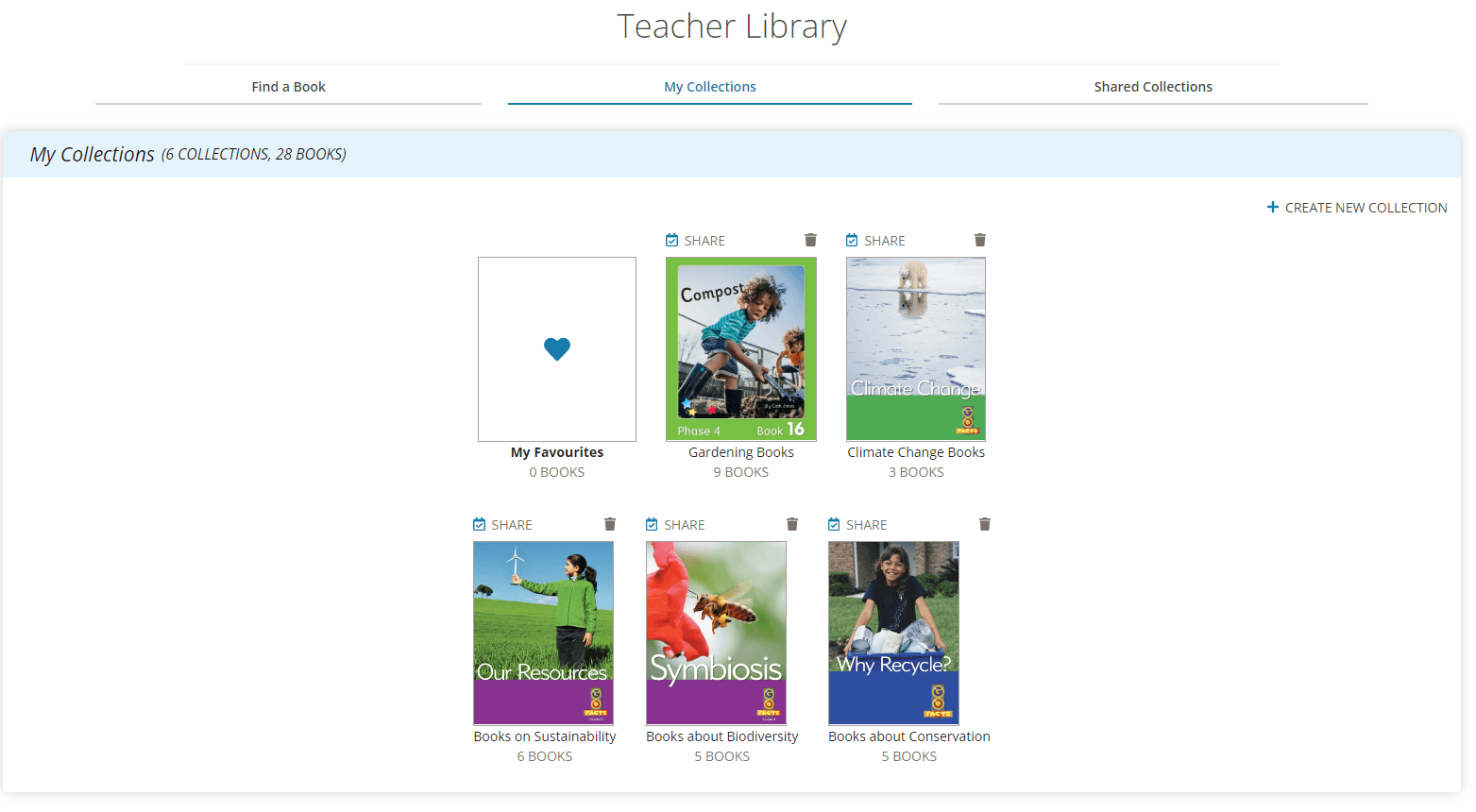
Ignite your students' passion for reading this Earth Day with the Teacher Library in Reading Eggs!
With just a few clicks, you can create personalized book collections that will captivate your students. These curated selections can enhance learning themes and keep your class engaged during guided reading sessions, making reading an exciting and educational adventure.
Create and share you unique book collection for your students! Log in here
Don’t have Reading Eggs? Sign up for a FREE school trial and get access to an ever-expanding library of 4,000+ books!
